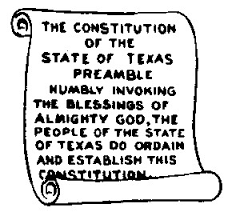Hey, remember how in odd numbered years there are some number of constitutional amendments to vote on in November? This is the one thing that guarantees you have a reason to turn out regardless of what your city or school district is doing. Reform Austin runs down this year’s tableau. I’m going to zoom in on two of them, one of which I think is good and one of which I think is bad.
Proposition 3 (SJR 27)
What it says: “The constitutional amendment to prohibit this state or a political subdivision of this state from prohibiting or limiting religious services of religious organizations.”
What it means: Proposition 3 would amend Article 1 of the Texas constitution by adding a new section to prohibit the state or any political subdivision from enacting a law, rule, order, or proclamation that limits religious services or organizations. Arguments against this amendment cite COVID as one valid reason to suspend religious services, approving this proposition would prevent authorities from banning this type of events even during a worldwide pandemic.
What it says: “The constitutional amendment changing the eligibility requirements for a justice of the supreme court, a judge of the court of criminal appeals, a justice of a court of appeals, and a district judge.”
What it means: The amendment would change the eligibility requirements for the following judicial offices: a justice of the supreme court, a judge of the court of criminal appeals, a justice of a court of appeals, and a district judge.
New requirements would include:
- Candidates should be residents of Texas as well as citizens of the United States;
- Candidates should have 10 years of experience in Texas as a practicing lawyer or judge of a state or county court for candidates of the supreme court, Texas Court of Criminal Appeals, or a court of appeals;
- Candidates should have 8 years of experience in Texas as a practicing lawyer or judge of a state or county court for candidates of a district court;
- It would disqualify candidates if their license to practice law was revoked or suspended during experience requirement; and
- These requirements would be applied to individuals elected or appointed to a term beginning after January 1, 2025.
You can probably guess which one I think is which, but just so we’re clear I’ll be voting for Prop 4 and against Prop 3. I suppose given the recent shadow docket rulings from SCOTUS about local restrictions on religious services during COVID that Prop 3 isn’t actually doing anything that isn’t already the law, but it’s still a bad idea and I refuse to put it in our overstuffed Constitution.
Beyond that, none of the remaining bunch looks all that bad to me. Progress Texas endorses all but Prop 3 endorses five of the eight, opposing 3, 4, and 5. I noted during the session that the one thing missing this time around was an ugly fight over a nasty amendment – on that front at least, it was pretty boring – and you can see why. What do you think about these proposals?
UPDATE: The Trib has more.
UPDATE: I swear, when I looked at the Progress Texas page, I saw Yes for Props 4 and 5. Either I just misread it or they had an error. I actually think those props are OK, though I understand the objections. I’ll have to think about it some more.


Pingback: Endorsement watch: Vote No on Prop 3 – Off the Kuff
Hi Kuff, Progress Texas recommends a no on 3, 4, and 5, not just #3. 4 and 5 are part of the legislature’s attempt to get more control over judges and elections.
I don’t see anything with Prop 4 that’d result in me voting No. Last thing TX needs is (more) unqualified flunkies wearing a robe.
Donovan – Thanks for the feedback. Either I misread it initially or there’s been a change since I looked at it. I’ve made an update to my post.